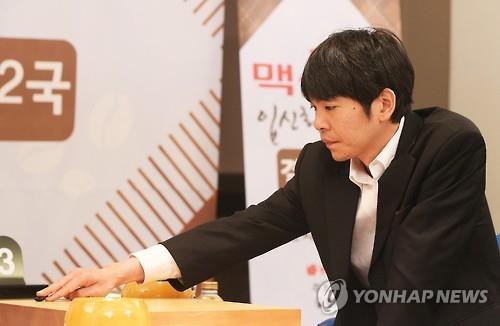ID :
406446
Thu, 05/12/2016 - 03:21
Auther :
Shortlink :
https://oananews.org//node/406446
The shortlink copeid
After defeat to Google AI, S. Korean Go master gets stronger

By Joo Kyung-don, Choi In-young
SEOUL, May 11 (Yonhap) -- South Korean Go master Lee Se-dol may have fallen to a machine, but the defeat seems to have made him stronger.
Lee, a ninth-dan with 18 international titles, lost 4-1 to Google's artificial intelligence program AlphaGo in the historic man-versus-machine showdown in March. But after the battle against the self-learning program, the 33-year-old has been invincible against humans.
Lee has won seven straight games since the five-round Go tournament named the Google DeepMind Challenge Match. In the process, he bagged his 48th career title after winning the Maxim Coffee Cup on Tuesday. Lee beat Won Seong-jin 2-0 in the best-of-three finals and took the 50 million-won (US$42,700) prize.
When asked about what has changed in his game since the AlphaGo meet, Lee said, "Nothing much." But he did admit that his "fighting spirit" has been revived because many fans supported him despite the loss to AlphaGo.
"It's difficult to explain, but in the past, I had ups and downs in my game and the difference was big," he said after winning the cup Tuesday. "But now, I think that gap is slim."
Go, known as "baduk" in Korea, originated in China more than 2,500 years ago. It involves two players alternately putting black and white stones on a checkerboard-like grid of 19 lines by 19 lines. The object is to claim larger territories than one's opponent by surrounding vacant areas of the board using one's own stones.
Lee, who went pro at the age of 12, has been known for his unconventional style of play, taking sequences that are out of the Go textbook. And because of his style of play, the match against AlphaGo was seen as a battle between human intuition and machine's calculation.
Lee said his style of play hasn't changed since the defeat to the human-like algorithm, but now he puts more emphasis on "reading," a skill that imagines branching paths of possibility. Google previously said the possible number of board configurations for Go is larger than the number of atoms in the universe.
"After the match against AlphaGo, I felt that I have to improve my accuracy in reading," Lee said. "I'm not going to just rely on my senses."
Fellow Go players said Lee should have also enhanced his ability to control his temper after facing the emotionless AlphaGo. After all, Go is a mind sport where the mental exercise component is more significant than the physical.
With the unbeaten streak, fans expect that Lee could enjoy another heyday in his career. Lee dominated the Go scene in the early 2000s, but he has faced increasing threats at the top of his profession. While the 23-year-old Park Jung-hwan stole his domestic No. 1 position in 2014, Chinese Go star Ke Jei, 18, has handled Lee at international events.
Lee said he doesn't care about the rankings but wants to extend his unbeaten run. His longest winning streak was in 2000, when he won 32 straight games. His next game is against the fifth-dan player Kim Dae-yong at the KBS King of Baduk tournament Monday.
For his 19th international title, Lee will face Park at the semifinals of the Ing Cup starting June 10. He reached the semifinals after beating Andy Liu of the United States, Lin Lixiang of Chinese Taipei and Kang Dong-yun in April. Lee has yet to win the quadrennial event.
Despite the mounting expectations on him, Lee said it will be too early to say that he got stronger after the AlphaGo experience. But Lee hinted that he may admit it when he continues to win.
"I'm just keeping a good 'force' in my game," he said. "If I can manage to win more than 10 straight games, then maybe I should say (I got stronger)."
kdon@yna.co.kr
(END)





